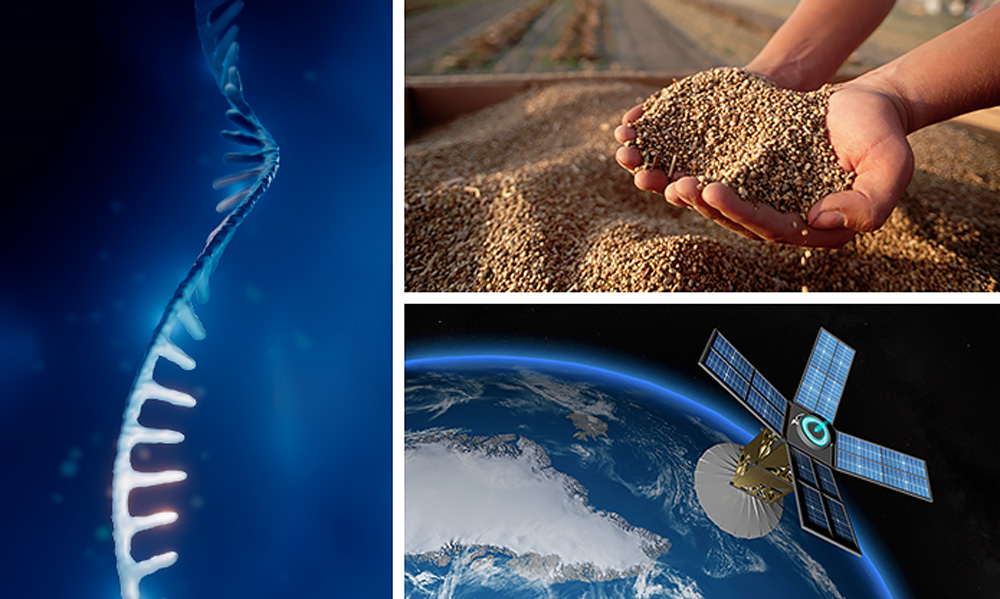In 2023, the Foundation’s Challenge Programme will award up to DKK 360 million for researchers who want to engage in the following three themes:
- RNA- and Oligonucleotide-based Therapeutics
- Prediction of Climate Change and Effect of Mitigating Solutions
- Future Agri-Food Systems
Each of the three Challenge Programme themes addresses a major societal challenge: Development of new RNA-based and oligonucleotide-based therapeutics that goes beyond vaccines; data-driven climate models that can provide robust predictions of climate change and the effect of mitigating solutions; and a transformation of our agri-food systems that will secure sustainable and healthy foods for a growing world population.
“The COVID-19 pandemic as well as the ongoing invasion of Ukraine are urgent reminders that we need to rethink how we safeguard people’s and the planet’s health, the green transition of society and our food supplies. These conditions are closely linked to the challenges selected for the Challenge Programme 2023. Together, the three themes give a clear indication of where we need to channel our research attention to ensure long-lasting solutions to some of the major societal challenges facing us now and in the decades to come,” says Mads Krogsgaard Thomsen, CEO, Novo Nordisk Foundation.
Find more information about the three themes and challenges below.
Beyond vaccines: Developing new therapeutics based on RNA and other oligonucleotides
The toolbox for drug discovery is continuously expanding beyond traditional small molecules, peptide- and protein-based therapies.
During the last couple of years, many of us have become familiar with the mRNA vaccines developed against COVID-19. However, therapeutics based on RNA and other oligonucleotides have the potential for a much broader application than vaccines. It is a rapidly evolving area that may accelerate drug development processes from discovery to clinic.
Among other uses, RNA- and oligonucleotide-based therapeutics have great potential within personalised medicine because the technology makes it possible to adjust a treatment to a patient’s genetic background.
To advance the translational potential of RNA- and oligonucleotide-based therapeutics, this Challenge Programme 2023 theme will support projects that develop fundamental research and thus contribute to new insights in this field.
The specific challenge of this theme is to support fundamental research that facilitates the development of these therapeutics beyond treatment of rare diseases and vaccine purposes. Such research is required to develop novel therapeutics for common clinical conditions, primarily cardiometabolic diseases, that efficiently target the relevant tissue, cell types and subcellular localisation.
Improved models for prediction of climate change and effect of mitigating solutions
Human-induced climate change constitutes one of the most pressing global challenges in modern times. If we fail to mitigate these changes, it will likely push the planet to a tipping point where we will experience catastrophic disruptions to ecosystems, society and our economies.
In recent decades, complex systems models have proven key for predicting climate change and for identifying human-induced and natural drivers of climate change, e.g. global warming levels of 2°C above preindustrial baseline or atmospheric concentrations of CO2 above 350 ppm.
As new climate change mitigation and adaptation strategies are being suggested or initiated across the globe, it is also of utmost importance to understand the relevance and consequences of such actions. However, current climate models are limited by relatively poor temporal and spatial resolution, due to limited quality and availability of data and lack of computational power.
This will not likely be solved by a single discipline or technology but requires a united and interdisciplinary effort. Therefore, this Challenge Programme 2023 theme invites interdisciplinary approaches to solving this major challenge.
The specific challenge of this theme is to develop data-driven, next-generation climate models with the purpose of enabling robust predictions of climate change and prediction of the effect of mitigating solutions. The aim is to significantly advance our causal understanding of the fundamental mechanisms and consequences on a regional and/or global scale.
Healthy and nutritious food for a growing world population
Producing healthy and nutritious food for a growing world population without exhausting our planet’s resources is a pressing global challenge. 30% of all greenhouse gas emissions are derived from food systems, and 80% of biodiversity loss is caused by agriculture. On top of this, one third of the food we produce is lost or wasted along the food chain, which adds to the challenges of resource efficiency.
To counteract this development, this Challenge Programme 2023 themewill support a transformation of our current agri-food systems into circular systems with high productivity, food security, low environmental impact, and net zero greenhouse gas emissions.
The specific challenge of this theme is to enable transformation of agri-food systems that will secure sustainable and healthy foods for all. The programme is interdisciplinary and aimed at fundamental and strategic research spanning primary production to consumption and financial structures required for this transition.
About the Challenge Programme
The Novo Nordisk Foundation established the Challenge Programme in 2014. Since then, the Foundation has awarded more than DKK 100 million every year for ambitious research projects based on a thematic approach addressing some of the major societal challenges.
In 2023, the Foundation will award up to DKK 360 million through the Challenge Programme in total. Each project can receive up to DKK 60 million for a six-year period.
Find more information about the Challenge Programme and previous grant recipients here.









